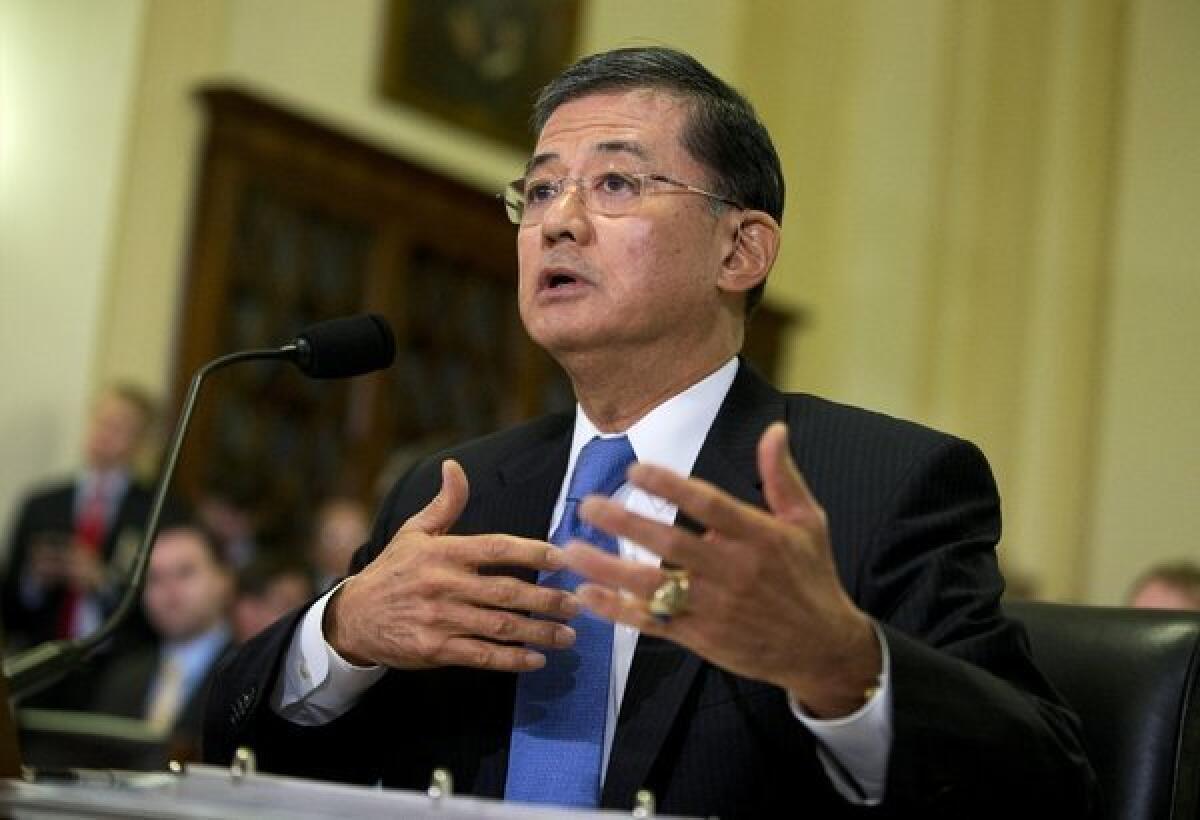No longer the Greatest Generation’s VA

- Share via
Just in time for Veterans Day, the embattled secretary of Veterans Affairs, Eric K. Shinseki, announced last week that his department had reduced its backlog of overdue disability claims from more than 600,000 in March to about 400,000.
“The trend line is in the right direction,” Shinseki told reporters, noting that the VA had cut the number of claims older than a year by 93%.
With hundreds of thousands of cases still unresolved, Shinseki hasn’t gotten much credit so far — but to the surprise of his critics, he’s on track to achieve his goal of eliminating the backlog by 2015.
Still, that won’t solve all the VA’s problems; far from it.
In the seven months since March, hundreds of thousands of new claims have flooded into the VA — business-as-usual for an agency that provides pensions, disability benefits and healthcare for many of the nation’s 22 million veterans.
The largest number of claims has come from the Vietnam generation, who are reaching the age of increased illness and disability. Their access to benefits was expanded under Shinseki with a new rule that held that any vet who spent time in Vietnam is presumed to have been exposed to Agent Orange.
The Vietnam cohort is followed by veterans of the 1990-91 Persian Gulf War, many of whom are nearing retirement age as well.
The 2.6 million veterans who served in Afghanistan and Iraq account for only about one-fifth of VA claims, but that number will surely grow. And it will be augmented by hundreds of thousands of current service members who will turn into veterans as the Defense Department budget shrinks.
Many of these new veterans are struggling with problems that were either unknown or neglected in earlier generations, such as traumatic brain injury and post-traumatic stress disorder. They’re quicker to request benefits than their elders; more than half of returning Iraq and Afghanistan vets have already filed health or disability claims. And they are understandably impatient with a VA bureaucracy that was designed to serve the citizen army that fought in World War II.
Its 20th century business model is “outmoded,” noted Phillip E. Carter, an Army veteran of the Iraq war who is now a scholar at Washington’s Center for New American Security.
I asked Carter, a Democrat, and veteran Anthony J. Principi, a Republican — both thoughtful students of the veterans’ benefits system — what their prescriptions would be. You may be surprised that they agreed on many points.
Carter worked on President Obama’s 2008 campaign. Principi, a Navy veteran of Vietnam, served as secretary of Veterans Affairs under President George W. Bush.
First, they don’t see the problem as one of budgets or resources. The VA is already the second-largest agency in the federal government, second only to the Defense Department; its budget request for the current fiscal year was $153 billion. No member of Congress wants to be seen as shortchanging veterans; this year, Congress even exempted the VA from its budget sequester.
“No one should be falling through the cracks with a $150-billion budget,” Principi told me. “It’s a systemic problem.”
Part of the challenge, he said, is one of focus: making sure the government’s efforts concentrate on the veterans who need help most. The VA has built a huge infrastructure of hospitals and medical clinics, but many younger veterans, rural veterans and veterans with mental health problems aren’t reached.
Principi worries that the Agent Orange decision has encouraged too many veterans of his generation to seek benefits, shouldering needier vets aside.
“You can spend one day in country in Vietnam, and 50 or 60 years later be diagnosed with the diseases that are most common in elderly men — prostate cancer, heart disease, lung cancer — and you’re eligible for disability compensation whether you were exposed to Agent Orange or not,” he told me. “It’s an entitlement program that I think has gone awry.”
Carter disagrees in general — he thinks expanding Agent Orange benefits righted a long-standing injustice — but agrees that the VA needs to tighten some of its rules.
“It’s a problem of both too much and too little,” he said.
“It’s too much for veterans that probably are overcompensated for, say, tinnitus of the ear or sleep apnea. But it’s also too little for veterans who fall between the cracks.”
And in the future, the VA faces a paradox: fewer veterans overall as the World War II, Korea and Vietnam generations disappear, but acute needs from Iraq and Afghanistan vets whose problems aren’t apparent yet.
“Demand tends to peak 10 to 20 years after a war,” Carter said. “By then, the VA’s current medical system, built to serve 22 million or more veterans, is likely to look bigger than necessary. There will be a projected 14 million veterans in 2035; the system will need to be reconfigured to fit the problems of those vets. That probably means closing some facilities and opening others,” Carter said.
But closing veterans’ hospitals is no easier than closing military bases; in fact, it may be harder. “Difficult,” said Principi. “Politically fraught,” noted Carter.
So here’s a suggestion for President Obama as he considers priorities for his final years in office: Convene a bipartisan commission to remake the VA. Shinseki has made a start at fixing the current claims system, but redesigning his department is a big, complicated job that can succeed only with buy-in from veterans in both political parties.
It would be a legacy — and the necessary completion of a goal Obama set when he first ran for president: ending the wars in Afghanistan and Iraq.
Twitter: @doylemcmanus
More to Read
A cure for the common opinion
Get thought-provoking perspectives with our weekly newsletter.
You may occasionally receive promotional content from the Los Angeles Times.











